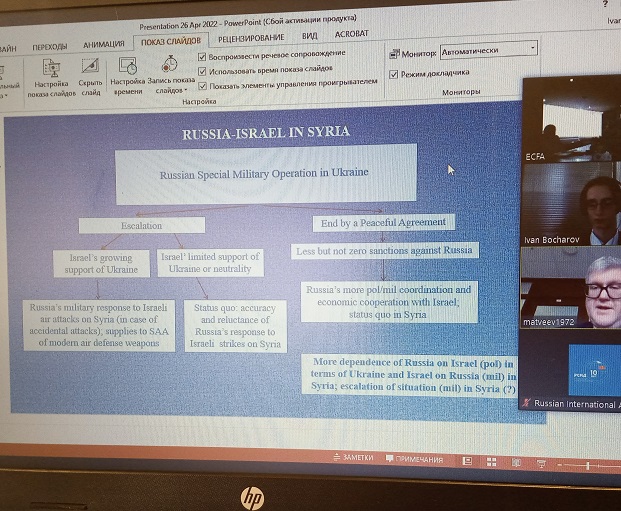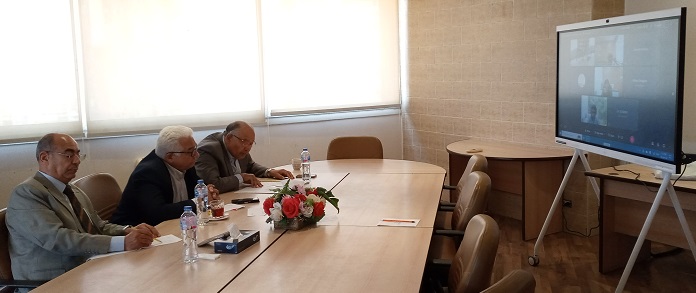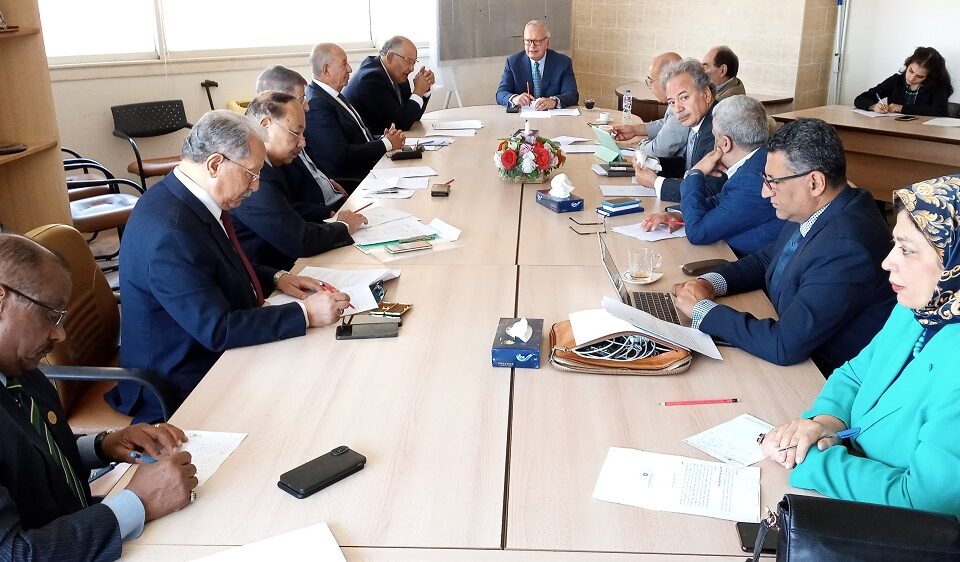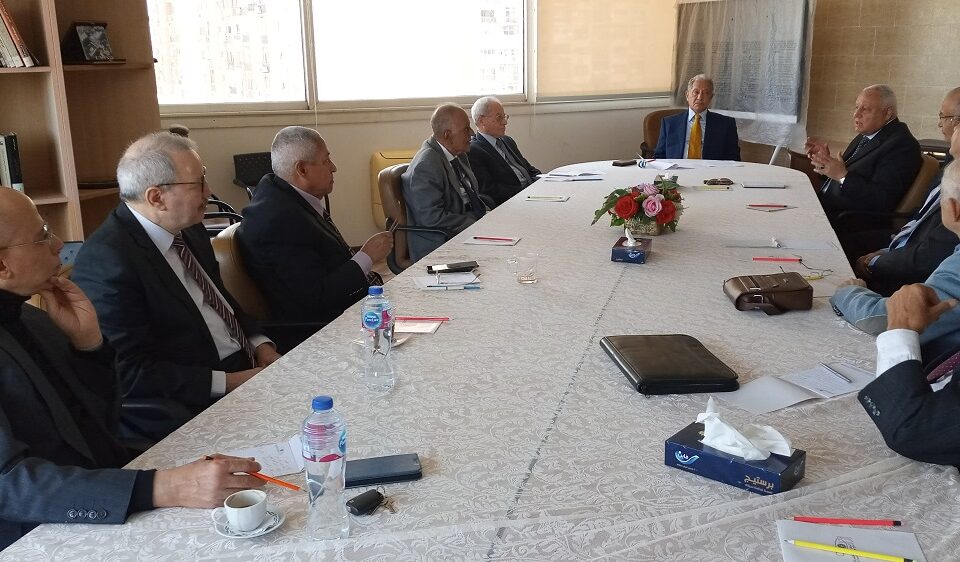On April 26, 2022, the Egyptian Council for Foreign Affairs and its Russian counterpart for International Affairs (RIAC) held a joint virtual symposium on “The situation in Syria in relation to the Ukraine war”, focusing on prospects for a political settlement of the Syrian crisis, and the humanitarian situation entrusted to it. It was opened and attended by both Ambassador Dr. Ezzat Saad and Mr. Andrey Kortunov, the directors of the Egyptian and Russian councils, respectively, as well as Ambassadors Dr. Alaa El Hadidi and Dr. Mohamed Badr El Din Zayed, from the Egyptian side; and from the Russian side, Mr. Igor Matveev and Mr. Boris Dolgov, researchers at the Institute of Oriental Studies of the Russian Academy of Sciences, and Mr. Vasily Kuznetsov, head of the Center for Arab and Islamic Studies at the Institute of Oriental Studies, as well as Mr. Ivan Bocharov, researcher at RIAC, and others.
Ambassador Saad indicated, in connection with the Egyptian position on the crisis, that since the outbreak of the Syrian revolution in 2011, that position was based on two pillars: the first: the full rejection of the fall of the Syrian state in the hands of extremism and terrorism, and the second: support for the legitimate aspirations of the Syrian people for a better future. Accordingly, Egypt supported the political settlement of the crisis in accordance with Security Council Resolution No. 2254, on the basis of preserving Syria’s unity, territorial integrity and sovereignty, and putting an end to all forms of external interference in its affairs, in order to provide an environment conducive for the return of refugees and internally displaced persons to their homes in accordance with the standards of the United Nations High Commissioner for Refugees. This is while Mr. Igor Matveev focused on the repercussions of the transformations of the regional and international scene, as well as the Ukrainian crisis on the dynamics of the conflict in Syria, explaining that if an agreement is reached with Iran regarding its nuclear program, this will have positive repercussions on Syria economically, while a kind of alternation will result between cooperation and competition between Iran and Russia in Syria, but if this does not happen, confrontations between Iran and Israel in the Syrian territories are likely to escalate.
On his part, Ambassador Dr. Alaa Al-Hadidi, who tackled the international situation from Cairo’s perspective, explained that there are several scenarios proposed, in connection with what is taking place in Ukraine now, including: (a) the end of the war in Ukraine in a short period of time, (b) the continuation of the war for a long period to come, which may extend for several months or more, given the belief of some that the United States and its allies seek to prolong this war and turn it into a quagmire that drains Russia, similar to what happened in Afghanistan before. (c) the expansion of the conflict in Ukraine to include other countries, (d) reaching a political solution to the Ukrainian crisis after both sides realize the difficulty of achieving a decisive military victory over the other side, which would reflect positively on the situation in Syria.
On his part, Mr. Boris Dolgov indicated that the main causes of the Syrian crisis originated from external factors, by international and regional forces, and perhaps this mainly consists of terrorist organizations such as ISIS, which some forces attempt to recruit and revive in Syria. This is in addition to the occupation of Syrian territories by some foreign powers, such as Turkey in Idlib, as well as the United States, all of which would complicate the Syrian crisis and limit the chances of reaching a peaceful settlement regarding it. In a related context, Ambassador Badr El-Din Zayed indicated that it is necessary to consider the Syrian crisis and its complex paths before the outbreak of the Ukrainian crisis and the start of its repercussions, as it can be described as being contested by two paths: the first is positive in the direction of settlements and overcoming the suffering of the Syrian people, and the second is negative that impedes these chances. As for the positive path, several factors can be monitored, most notably the signs of gradual openness between the Syrian government and a number of Arab parties, led by the UAE. As for the negative manifestations, they are topped by the entrenchment of a status quo of the Turkish occupation of vast areas in the northwest of the country and up to Idlib Governorate, and similar conditions to the presence of a US-Western military presence in the Syrian-Kurdish border belt adjacent to Turkey. But the most dangerous thing is the entrenchment of political authorities other than that of the Syrian government.
On his part, Mr. Vasily Kuznetsov indicated that the humanitarian situation in Syria is closely linked to that in Lebanon, where there is a shortage of food and energy resources and soaring prices…etc. This complex situation is linked in one way or another to the Ukrainian crisis, which severely affected Ukrainian wheat supplies to Lebanon, and whose events may escalate into a series of wars whose extent is unknown, and which would consequently affect both the humanitarian situation in Syria and the peace settlement that is hoped to be achieved in it.
Visit by Mr. Ruslan Nechai Chargé d’Affaires of the Embassy of Ukraine in Cairo
April 26, 2022Ambassador Hisham El-Zimaity participates in a virtual symposium organized by the Chinese Institute for Financial Studies in Beijing
May 6, 2022Visit by Mr. Ruslan Nechai Chargé d’Affaires of the Embassy of Ukraine in Cairo
April 26, 2022Ambassador Hisham El-Zimaity participates in a virtual symposium organized by the Chinese Institute for Financial Studies in Beijing
May 6, 2022





